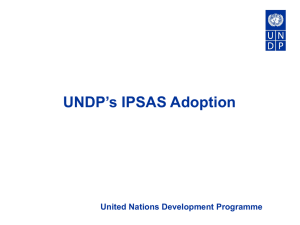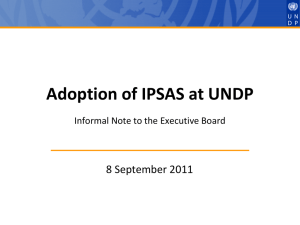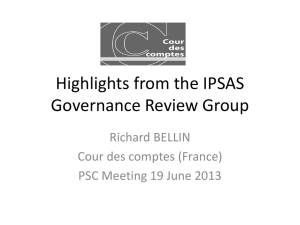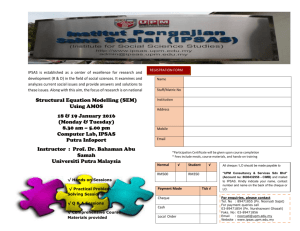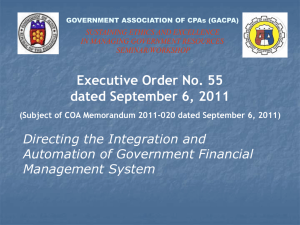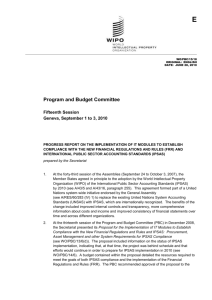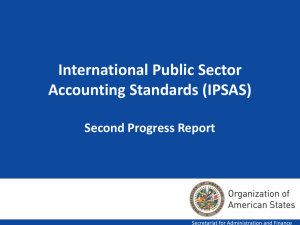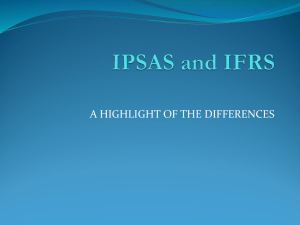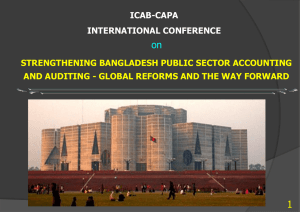IPSAS
advertisement
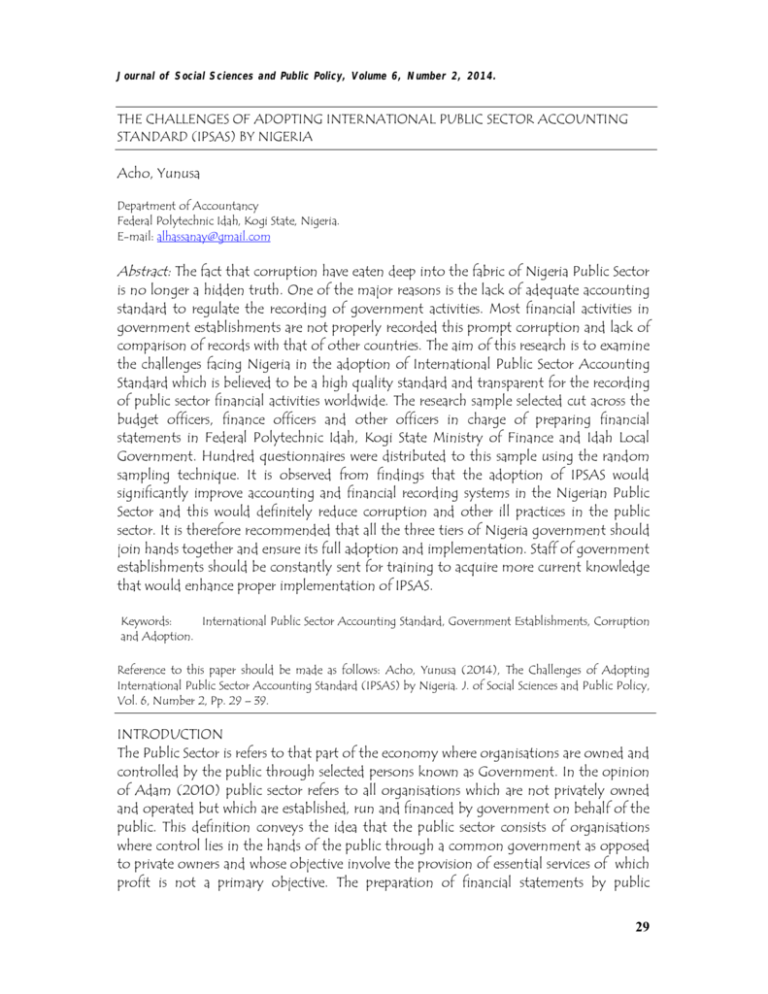
Journal of Social Sciences and Public Policy, Volume 6, Number 2, 2014. THE CHALLENGES OF ADOPTING INTERNATIONAL PUBLIC SECTOR ACCOUNTING STANDARD (IPSAS) BY NIGERIA Acho, Yunusa Department of Accountancy Federal Polytechnic Idah, Kogi State, Nigeria. E-mail: alhassanay@gmail.com Abstract: The fact that corruption have eaten deep into the fabric of Nigeria Public Sector is no longer a hidden truth. One of the major reasons is the lack of adequate accounting standard to regulate the recording of government activities. Most financial activities in government establishments are not properly recorded this prompt corruption and lack of comparison of records with that of other countries. The aim of this research is to examine the challenges facing Nigeria in the adoption of International Public Sector Accounting Standard which is believed to be a high quality standard and transparent for the recording of public sector financial activities worldwide. The research sample selected cut across the budget officers, finance officers and other officers in charge of preparing financial statements in Federal Polytechnic Idah, Kogi State Ministry of Finance and Idah Local Government. Hundred questionnaires were distributed to this sample using the random sampling technique. It is observed from findings that the adoption of IPSAS would significantly improve accounting and financial recording systems in the Nigerian Public Sector and this would definitely reduce corruption and other ill practices in the public sector. It is therefore recommended that all the three tiers of Nigeria government should join hands together and ensure its full adoption and implementation. Staff of government establishments should be constantly sent for training to acquire more current knowledge that would enhance proper implementation of IPSAS. Keywords: International Public Sector Accounting Standard, Government Establishments, Corruption and Adoption. Reference to this paper should be made as follows: Acho, Yunusa (2014), The Challenges of Adopting International Public Sector Accounting Standard (IPSAS) by Nigeria. J. of Social Sciences and Public Policy, Vol. 6, Number 2, Pp. 29 – 39. INTRODUCTION The Public Sector is refers to that part of the economy where organisations are owned and controlled by the public through selected persons known as Government. In the opinion of Adam (2010) public sector refers to all organisations which are not privately owned and operated but which are established, run and financed by government on behalf of the public. This definition conveys the idea that the public sector consists of organisations where control lies in the hands of the public through a common government as opposed to private owners and whose objective involve the provision of essential services of which profit is not a primary objective. The preparation of financial statements by public 29 Acho, Yunusa organisation is the only means of communicating about the entity to the diverse interested parties to such entity. However, John (2011) noted that the manner in which an entity whether private or public present information in its financial statements is of paramount importance as financial statements remain a central feature of financial reporting, a principle means of communicating financial information to those outside an entity. It is in view of this significance that the preparation of financial statement is now a global issue and its relevance have attracted worldwide attention. This made the international Federation of Account (IFAC) board known as international public sector Accounting Standard Boards (IPSASB) to establish Accounting Standard referred to as public sectors accounting standards IPSAS for public sectors. IPSAS are accounting standard developed by IPSAS board for all categories of government both at National, regional and Local government to aid in the preparation of their financial statements. IPSAS are standards of high quality which serve as catalyst for providing sound and transparent financial statements, thereby improving operational performance, accountability and fair allocation of resource. Adeboye (2011) noted that IPSAS is a high quality standard that will ensure good financial practice in the public sector. He further explained that with IPSAS in place in public sector, financial irregularities can hardly be swept under the carpet no matter how minuet they may be in size because IPSAS has more inherent or inbuilt system of internal control operatives on a very sound footing. It is observed that Nigerian Public sector have often time intensified effort to ensure that the available financial reporting system should not be deficient and proper attention paid to variances from plans thereby indicating the need for financial reports to be available on time as well as meet the reliability test when produced. But unfortunately not much has been achieved through these efforts. Many countries of the world have adopted IPSAS and have standard preparing their financial statements in line with the standards. Developing countries like Nigeria regardless of their political and economic system are urged by International Organisations to adopt IPSAS as it would help the International Organisations to provide them the financial assistance that they need (Chan, 2008). Adopting IPSAS by developing countries would also help in reducing the corrupt practices that is paramount in developing countries. Due to the significance of IPSAS, Nigeria government have been making serious effort so that public entities in Nigeria fully adopt the international public sector Accounting Standard (IPSAS) which according to the earlier arrangement was supposed to be effective from January, 2013 for the cash basis and January, 2015 for the accrual basis. Unfortunately, this was not possible due to some inherent challenges which the country has to overcome. Some of these challenges are lack of professionals in the public sector to carry out the process, inadequate information and communication facilities, amendment of the Nigeria constitution so as to make provision for the accounting standard that should be used in preparing financial statements. The adoption date is now January, 2014 for the cash basis and January, 2016 for the accrual 30 Journal of Social Sciences and Public Policy, Vol. 6, No. 2, 2014. basis. However, this study shall examine the challenges responsible for the delay in the adoption of the standards in Nigeria and proffer possible recommendations. LITERATURE REVIEW AND CONCEPTUAL FRAMEWORK International Public Sector Accounting Standards – A General Overview The preparation and presentation of financial statement at each level of government have pose series of problems worldwide. Predominantly, accounting or financial reporting places emphasis on accountability and transparency. Revolution is not only accorded to government functional activities, instead revolution also exists in Government Accounting. Hence IPSAS i.e. international public sector accounting standard is a new revolution in government Accounting, IPSAS are international Accounting Standard used as guidelines by prepares of public sector financial Statements. According to Hayfron Adoagye (2012), IPSAS are high quality global financial reporting standards for application by public sector entities other than government business enterprises and being issued by international public sector accounting standard board IPSAS B which is formerly known and called public sector committee. IPSASB’s a body of International Federation of Accounting (IFAC) with autonomy to develop and issue IPSAS. In a study conducted by John (2011) he revealed that IPSAS Board comprises of 18 members, out of which 15 are nominated by the member bodies of IFAC while the other three are appointed as public members whom may be appointed by any individual or organisation. IPSASB is to achieve the following objectives. Issuing International public sector Accounting Standards IPSAS on both cash and accrual accounting. The board has issued about 32 accrual standards and one comprehensive cash basis of IPSAS. Promote the acceptance and international conveyance of the standards. Publishing other documents which provide guidance on issues and experiences in financial reporting in the public sector. The main aim of IPSAS is to enhance the quality of general purpose financial reporting by public sector which would provide better means of assessing the resources allocation by government and also increased transparency and accountability. Since the standard is believed to be of high quality, it would definitely improve the reporting system in government ministries and parastatals. According to Aganga (2011) he pose it that the main objectives of IPSASB is to serve the public interest by developing standards and facilitating the convergence of international and national standards which will enhance the quality and uniformity of financial reporting throughout the world. ACCOUNTING BASIS PROVIDED BY THE BOARD FOR ADOPTION International Public Sector Accounting Standards (IPSAS) have two main accounting basis namely cash and accrual basis. A country is expected to adopt either cash or accrual basis 31 Acho, Yunusa or both Accounting Standards depending on the specific needs and system of financial operation in place for the government or the country in question. Adams (2010) noted that the cash basis allows providers of external assistance to follow a variety of account practices. To this effect, many recipient of external assistance therefore maintain their accounts on the cash basis and the development of a comprehensive cash basis IPSAS is indeed a step in the right direction he added. Perhaps, accrual accounting focuses on revenue, cost, assets, liabilities and equity instead of cash flow only. The capitalization of assets, such as computers and machines, makes it possible to calculate depreciations and account for them in each period during which the machine is put to use. Most of the IPSAS are accrual based which is in line with international financial reporting standard (IFRS) applicable in the private sector. ADOPTION OF IPSAS BY NIGERIA Nigeria like developed countries and other developing countries is expected to adopt the international public sector Accounting Standards (IPSAS) and it’s in the process of adopting the standards. Adopting the standard would be good for the country as the standard would help in improving the country’s accounting and financial reporting system making it comparable with global standards, Onwubuariri (2012). The Federal executive council in July 2010 gave full approval for the adoption of IPSAS for the public sector and the Federal Government made the pronouncement for the adoption of IPSAS on 3rd September, 2011 which is expected to take place in 2013. According to Ngama (2012) he noted that Nigeria is in the process of adopting the standards (IPSAS) because it would be suitable for Nigeria and that the delay is because the country wants to develop a chart of account and general financial statement that will meet the international best practices required by IPSAS. The institute of charted Accountants of Nigeria also endorse the Adoption of IPSAS by Nigeria public Sector as a basis for financial reporting because of the transparency and accountability element in the reporting system. Nigeria is to adopt the first part of the standard which is the cash basis in 2013 but this was not possible due to some inherent challenges of IPSAS Adoption. Though adopting the cash basis is not an easy task as no country in the world can boast of full adoption of the cash basis because the key requirement to produce consolidated financial statement for all controlled entities is not an easy task and also to consolidate governments business entities, Ministries and Parastatals is also time consuming. This is why many countries start the adoption of IPSAS with the accrual basis first. For Nigeria, the adoption date of the cash basis is now 2014 and all hands are on desk trying to meet up with the adoption this year. The accrual basis would be adopted in 2016. The sub-committee to work out the modalities for the adoption of IPSAS by the 32 Journal of Social Sciences and Public Policy, Vol. 6, No. 2, 2014. three tiers of Government have been organising workshop, field trips and seminars on IPSAS in all the six – geo political zones of the country to ensure its reality. According to Nango (2014) who is a member of FAAC, he noted that the subcommittee have even gone far as reviewing the current book-keeping system, accounting and reporting system and chat of account currently used by the three tiers of government. The committee started their interactive session with the political leaders, key officers in Federal ministries, permanent secretaries state governors, relevant commissioners within the 36 State and Local Governments. This is to enable the committee to obtain information on all aspects of their budgeting. Book – keeping and financial accounting reporting system. In other to enhance effective adoption and implementation of IPSAS in Nigeria the Sub – Committee of FAAC have developed the following for all government – establishments in Nigeria. Uniform National Chart of Account and User manual for the chat Uniform accounting policies Uniform budget templates that align with IPSAS cash basis Format of general purpose financial statements for both cash accrual basis of IPSAS. EXAMINATION OF IPSAS CONVERGENCE WITH IFRS It is observed that the International Public Sector Accounting Standard has strong similarities or convergence with International Financial Reporting Standard designed for the private sector. According to Apiah (2009), he remarked that one of the outstanding qualities of IPSAS is the fact that it has convergence with the international financial reporting standard (IFRS) adopted in the private sectors. He also noted that IPSAS and international financial reporting standard (IFRS) convergence programme is an important element in the Board work programme. The IPSAS Board policy is to converge the accrual basis in International Public Sector Accounting Standard (IPSAS) with IFRS issued by the International Accounting Standard Board (IASB) where appropriate for public entities. Accordingly therefore, accrual basis of IPSAS that are converge with IFRS maintain the requirements, structure and text of the IFRS unless there is a public sector specific reason for a departure. Departure from equivalent IFRS occurs when requirement or terminologies in the IFRS are not appropriate for the public sector or when inclusion of additional terminology or example is necessary to illustrate certain requirement in the public sector context. In the words of Hayfron Aboagy (2012), he said that IPSAS board have so far been able to issue thirty two (32) accrual IPSAS and one (1) comprehensive cash IPSAS this is also in line with IPSAS handbook published in March, 2011. 33 Acho, Yunusa Among the issued accrual IPSAS are the following:IPSAS 1: Presentation of financial statements IPSAS 2: Cash flow statements IPSAS 3: Accounting policies, changes in accounting estimates and errors. IPSAS 4: The effect of changes in foreign exchange rates IPSAS 5: Borrowing costs IPSAS 6: Consolidated and separate financial statements IPSAS 7: Investment in associates IPSAS 8: Interest in joint venture IPSAS 9: Revenue from exchange transactions IPSAS 10: Financial reporting in hyperinflationary economics IPSAS 11: Construction contracts IPSAS 12: Inventories IPSAS 13: Leases IPSAS 14: Events after the reporting date. IPSAS 15: Financial instruments disclosure & presentation IPASA 16: Investment properly IPSAS 17: Property, plant and Equipment (PPE) IPSAS 18: Segment reporting IPSAS 19: Provisions, contingent liabilities and qualifying assets IPSAS 20: Related party disclosure IPSAS 21: Impairment on non-cash generating assets. IPSAS 22: Disclosure of information about the general sector IPSAS 23: Revenue from non-exchange transactions (taxes and transfers.) IPSAS 24: Presentation of budget information in financial statements. IPSAS 25: Employees’ benefits. IPSAS 26: Impairment of non-cash generating assets. IPSAS 27: Other presentation and disclosure standards IPSAS 28: 29 and 30 financial instrument, presentation, measurement and recognition and disclosure. IPSAS 31: Intangible Assets IPSAS 32: Agricultural income All the above listed IPSAS, have their IFRS equivalent except financial reporting under the cash basis. BENEFITS OF ADOPTING IPSAS IN NIGERIA In an attempt to join the on-going vehicle of global standard in the public Sector and to enjoy the benefits of the standard, the Federal Executive Council (FEC) in July 2010 approved the adoption of the International Public Sector Accounting Standard (IPSAS) for the public entities in Nigeria. In a workshop organised by the sub-committee of FAAC, Ngama (2012) the Former Minister of Finance told the participants that the implementation of IPSAS in Nigeria would promote a peer – review mechanism of 34 Journal of Social Sciences and Public Policy, Vol. 6, No. 2, 2014. financial reports among the three tiers of government. Infact, I am of the opinion that the adoption of IPSAS will serve as foundation for the preparation of quality financial statements and adequate reporting system in Nigeria Public Sector. Also, the then Accountant General of the Federation Jonah Otunla whose office is spearheading the adoption of IPSAS stressed that the accounting system would engender economic and political benefits for the country. On the economic side, Ngama (2012) also noted that the adoption of IPSAS would provide the basis for the establishment of a harmonized budgetary system for the three tiers of government. He further stressed that the era of IPSAS would also enhance the country’s eligibility to access economic benefits from donor agencies, private sector, Financial Institutions and Worldwide Financial Institutions such as the World Bank. The preparation of the country’s financial statement using IPSAS which is an international standard would definitely encourage investors into the country. Furthermore, it would also expose the in-house corrupt practice of some of the public officers thereby deterring them from such act. Nongo (2014) is also of the opinion that the adoption of IPSAS in the public sector accounting reporting system would enhance better service delivery in the public sector, support efficient internal control and bring into focus the performances of the agencies. It would also enhance creditability of government financial information and help build confidence of Nigerian citizens and Nigeria development partners both within and abroad. The adoption of IPSAS would also enhance access of information to the public thereby promoting the aims of freedom of information Act 2011 and facilitating the expression of individuals’ opinion on government activities. Adoption of IPSAS at the Local Government would also help to fight corruption which can be easily trace to the local government because of lack of proper accounting system stipulated by the subcommittee. Comparability of Nigeria Financial Statement with that of other country would be carried out with ease (Oulasvirta 2012). CHALLENGES FACING IPSAS ADOPTION IN NIGERIA However, all efforts at adopting IPSAS in the Nigeria public sectors have yielded no success due to some apparent challenges facing the country. It was due to these challenges of course that January 2013 being the target date for IPSAS adoption in Nigeria could not succeed, thereby causing an extension of adoption date to January, 2016 for accrual basis IPSAS and 2014 for the cash basis. The Nigeria public sector is characterized by determinates that create high level of reluctance in accepting changes especially on financial matters because of their corrupt attitudes. Furthermore the cost of implementing the standard is a big task as it would involve the cost of training personnel, writing of new accounting manuals, installation of 35 Acho, Yunusa adequate Information and communication technology software for the programme both at the Federal, State and Local government. Another major challenges is that the economics system is so porous that adherence to the local accounting standard is a problem let alone an international standard which would expose all activities to world. Also the constitution would have to be amended, so as to be able to inculcate the new standard or the standard needed for the preparation of public sector financial statement (Nkoyo, 2012). In Nigeria, the amendment of our constitution is always a long process and time consuming. Presently there are inadequate staffs to at the various government establishments to handle IPSAS implementation (Adebimpe, 2012). As such there no need for training and retraining of staffs for the IPSAS project to be successful. More specifically therefore, the key challenges facing the adoption of IPSAS in Nigeria as pointed out by John C (2011) In a paper entitled “IPSAS Adoption in Nigeria are as follows”. (a) Resistance: it is obvious that not all government administrative machineries such as ministries, parastatals and extra – ministerial departments are supporting IPSAS adoption in Nigeria. Without two thought in mind, this resistance is due to the obvious fact that IPSAS being a principle based standard which will help to unravel all forms of financial malpractices existing in the public sector, hence it’s a treat to these stakeholder in the public sectors. (b) Apparent complexities: the use of common languages to bring across culture and government in the public sector remains a key challenge. Some terminologies used in IPSAS may not apply to country’s financial reporting system due to some uniqueness. This however calls for thorough GAAP analysis. (c) Implementation cost: as part of the effort toward IPSAS adoption, accounting manual need to written to be able to incorporate IPSAS terminologies and other finance officers in the public sector need to be educated and trained on the application of IPSAS. All these cost good amount of money which may not be readily available or where available but mix-applied by public officers. (d) Lack of Qualified Accountant in the Public Sector: - most of the public sector and government agencies lack the necessary accounting personnel to adequately carryout the changes in IPSAS as opposed to the financial reporting frame work currently existing in Nigeria. METHODOLOGY Both primary and secondary methods of data collection were used in obtaining data. This is to enable the researcher give credibility to the secondary data obtained from related literatures. A five point likert scale questionnaire designed by the researcher were 36 Journal of Social Sciences and Public Policy, Vol. 6, No. 2, 2014. distributed to the sample selected. The population for the research is the Nigeria Public Sector which comprises of all government establishments such as federal ministries and parastatals, State ministries and parastatals and local governments. The research sample selected is federal polytechnic Idah, Idah local government and Kogi state ministry of finance Lokoja. The persons targeted were those officers in public financial management, budget officers, revenue planning officers, accountants and auditors. A random sampling technique was used to select a hundred respondents from the sample. DATA PRESENTATION AND ANLYSIS The data obtained through the questionnaire are analysed below. Only 90 questionnaires were duly filled and return. So the analysis would be based on the returned questionnaires Table 1: Factors Determining the Adoption and Impact of IPSAS S/N 1 2 3 4 5 6 Item SA IPSAS Adoption in Nigeria would foster transparency in its financial reporting. Percentages IPSAS adoption would help in fighting corruption 10 Percentages 11% The benefit of IPSAS adoption would far outweigh its cost of adoption Percentages The adoption of IPSAS would give Nigerians easy access to Government records and expression of opinion Percentage The use of IPSAS would attract foreign investors in Nigeria Percentage Qualified Professional Accountants are to be employed in public Sector for sound implementation of IPSAS Percentage - A I D SD Total 20 22% - 60 67% 10 11% 90 100% 45 50% 5 06% 30 33% - 90 100% 80 89% - 10 11% - 90 100% 80 89% - 10 11% - 90 100% 90 100% - - - 100% 60 - 30 - 90 67% - 33% - 100% Source: Questionnaire 2014. The analysis of the respondents opinion in table one above shows that the adoption of IPSAS would lead to transparency in financial reporting, help in fighting, corruption, help Nigerians to have easy access to government records and express their opinion on such records. The use of IPSAS by government would also help in attracting investors into the country. 37 Acho, Yunusa Table 2: Factors Determining the Challenges of IPSAS Adoption in Nigeria 7 8 9 10 11 12 The major challenges of IPSAS Adoption in Nigeria is lack of patriotism by Government functionaries 55 Percentages 61% Nigeria could not adopt IPSAS by January, 2013 due to lack of qualified accountants 10 Percentage 11% IPSAS could not be adopted by 2013 because of its apparent complexities Percentage A through GAAP analysis has been conducted by Government for IPSAS adoption Percentage Government Agencies now uses Budget and Performance monitoring software (BUPEM) to justify Government redness to adopt IPSAS Percentage Full compliance of the political will of government would definitely lead to proper implementation of IPSAS Percentages - 25 28% - 8 9% 2 2% 90 100% 40 45% 10 11% 30 33% - 90 100% 50 56% - 30 33% 10 11% 90 100% 70 76% 5 6% 10 11% 5 6% 100% 80 89% - 10 11% - 90 100% 90 100% - - - 90 100% Source: Questionnaire 2014. It is evidence from table 11 above that the main challenge confronting IPSAS full adoption in Nigeria is lack of Patriotism, lack of qualified staff, ICT Problems and complexities 0f the standards e t .c. CONCLUSION AND RECOMMENDATIONS Conclusion This study has shown that the adoption and implementation of IPSAS in Nigeria will help in the harmonisation of financial operations and uniformity in the reporting of public sector accounting information and disclosure. The study also revealed at a glance that IPSAS adoption will help to ensure better financial information disclosure and supports, improvement to accountability, transparency better financial management, better information to donor and countries providing external assistance, better quality and credibility of financial report. Recommendations Judging by the significant positive effects that will accompany the adoption and implementation of IPSAS in Nigeria as foreseen in the cause of this study. It is highly recommended that the Federal Government of Nigeria should make quick adoption of 38 Journal of Social Sciences and Public Policy, Vol. 6, No. 2, 2014. IPSAS as a matter of utmost priority and make same mandatory for the state and Local Government by first achieving the following. 1. Getting the support and political will of the Government as well as the patriotic spirit of the individual stakeholder in the public sector. 2. Strengthening of standard setters and regulatory bodies. 3. Recruitment and training of qualified staff 4. Development of adequate and proper accounting manual 5. Learning from other countries that have adopted the standards. 6. Involvement of all public sector stakeholders from Federal level to local government level in the adoption process. REFERENCES Adams R.A, (2010). Public Sector Accounting and Finance; Lagos: Corporate Publishers Ventures. Azzazy Apiah, (2009). IPSAS and Its Objective. Seminar Paper. Ghana. Chan J. (2008). International Public Sector Accounting Standards Conceptual and Institutional Issues. FAAC Sub-Committee, (2012). Improving the Public Sector Accounting System in Nigeria. Hayfron Aboagye (2012), IPSAS and Its Objectives. IPSAS Hardwork Published March, 2011. John C. (2011), IPSAS Adoption in Nigeria Step to Improved Accountability in the Nigeria Public Sector. Nongo J. Y. (2014). IPSAS Issue for Public Finance Management Executive – IPSAS Outlook. E.Y com/IPSAS. Olusegun Aganga 2011, IPSAS Adoption a Formidable Compliment to Effect Public Sector Instrument in Nigeria. A Seminar Paper. Abuja. Onwubuariri P. (2012). Improving Nigeria Public Sector Accounting Standards. Oulasvirta L. (2012). The Reluctance of a Development Country to Choose Yerima Ngama, (2012). Nigeria on Tract on IPSAS Implementation Workshop Abuja, International Public Sector Accounting Standards of IFAAC A Critical Case Study, University of Tampere School of Finland 39

